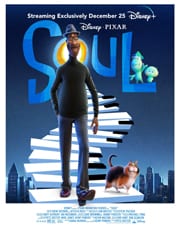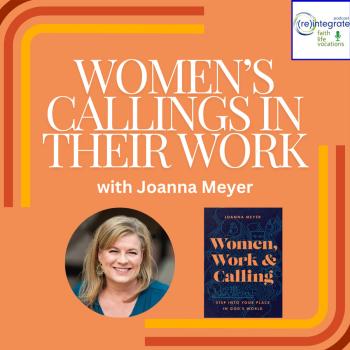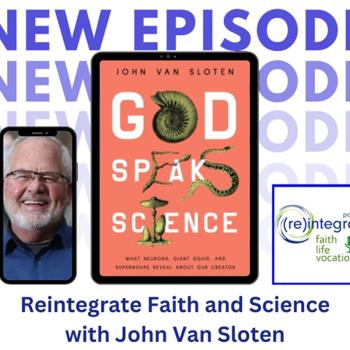Warning: SPOILER REVIEW (see NON-SPOILER review HERE)
 So, having done my non-spoiler review, let’s now discuss some of the deep things that “Soul” does and expresses.
So, having done my non-spoiler review, let’s now discuss some of the deep things that “Soul” does and expresses.
Joe (voiced by Jamie Foxx) is a talented Jazz pianist (piano stylings by John Batiste) who feels stuck teaching middle-school band. He is convinced that his grand purpose is to be a Jazz musician, but his mother (Phylicia Rashad) wants him to be realistic and take to offer to be a full-time teacher. His big break comes when a former student (voiced by Questlove) offers him the chance to play piano in a quartet with a highly renowned saxophonist (Angela Bassett).
However, Joe doesn’t make it as he accidentally falls into a manhole and goes into a coma, about to die. With the Reznor/Ross-composed synths helping us float into the “Great Beyond,” Joe’s translucent turquoise soul is on the great escalator (conveyor belt?) to the sky, and we hear what sounds like a bug-zapper as each soul enters. That’s funny, but it also highlights our anxieties about death.
Not wanting to die right at the point when he will finally fulfill his purpose in life, he runs away to another place, the “Great Before,” the place where preborn souls dwell and are preprogrammed with personalities and then their final “spark” that makes them ready for their earthly lives. Joe meets a defiant soul named 22 (Tina Fey) who doesn’t want to go to earth and live as a human. Her belief is summed up as a bunch of other souls seem to be crushed under a structure: “Don’t worry; they’re fine. You can’t crush a soul here. That’s what life on earth is for.” She teams with Joe to finagle their way around the system. However, their plan gets messed up when they arrive on earth because 22’s soul is caught in Joe’s body and Joe’s soul is caught in a cat’s body.
Comic fumbling ensues as they try to fix their body-swapping predicament with the help of a Bob Dylan listening hippy whose earthly job is twirling an advertising sign. Joe attempts to get himself ready for his big break as he tries to help 22 discover her “spark,” which he presumes is her grand purpose in life, like his dream of being a Jazz musician.
The Simple Pleasures
22, who never got the appeal of life on earth, slowly experiences small pleasures of earthly human existence, starting with her first slice of pizza, continuing to lollipops, and into music. And just the smells and sounds and sights of the goodness of physical life, including the simple sight of a fluttering helicopter seed falling toward her from a tree branch above her.
Meanwhile, Joe begins to realize that his obsession with being a Jazz star might have caused him to miss the real beauty of life and the real sources of meaning and happiness that he’s too-easily dismissed. He not only remembers the rapturous times when he was “lost” in playing the piano but also the joy of seeing a student experience that same joy as she plays her trombone. He remembers growing up with the love of his father and mother, the simple pleasure of riding a bike and peering up into the green trees, the marvel of watching fireworks and of eating pecan pie, the fulfillment of teaching music to young kids, the sensation of the ocean flowing over his bare feet, and all the simple pleasures of his life in New York.
What Is Your Spark?
 As I have studied, written, and spoke on the subject of calling and vocation, I’ve been struck by how many people have looked to me to discover the grand purpose of their lives. Their presumption is that God has given each of us a calling in which we will find satisfaction and our part in God’s plan. They think that our goal is to figure out what that calling is so that we don’t miss it. They allow themselves to believe that the reason they are miserable is that they haven’t found that calling yet. (God must be a real stinker, hiding it like that, right?)
As I have studied, written, and spoke on the subject of calling and vocation, I’ve been struck by how many people have looked to me to discover the grand purpose of their lives. Their presumption is that God has given each of us a calling in which we will find satisfaction and our part in God’s plan. They think that our goal is to figure out what that calling is so that we don’t miss it. They allow themselves to believe that the reason they are miserable is that they haven’t found that calling yet. (God must be a real stinker, hiding it like that, right?)
But let “Soul” tell you something profoundly different. This idea of finding meaning and satisfaction in chasing and then realizing your grand purpose is not what life is all about. If we obsess with that, we will miss the simple, everyday wonder of being human, of being image-bearers in a “very good” creation. As Joe finds out, we are not supposed to be so focused on “purposes” that we miss the joy of “regular old living.”
Near the end, Joe tells 22, “Your spark isn’t your purpose. That last box fills in when you’re ready to come live. And the thing is, you’re really great at jazzing.”
Jazz music becomes a metaphor for all of life.
The Smithsonian National Museum of American History defines Jazz:
Jazz is a kind of music in which improvisation is typically an important part. In most jazz performances, players play solos which they make up on the spot, which requires considerable skill. There is tremendous variety in jazz, but most jazz is very rhythmic, has a forward momentum called “swing,” and uses “bent” or “blue” notes. You can often hear “call-and-response” patterns in jazz, in which one instrument, voice, or part of the band answers another. Jazz can express many different emotions, from pain to sheer joy. In jazz, you may hear the sounds of freedom – for the music has been a powerful voice for people suffering unfair treatment because of the color of their skin.
Pete Docter and Kemp Powers (along with co-writer Mike Jones) have written and directed a feature that wants us to realize that life is constant improvisation. We are not always meant to know exactly where we are going in life or to find some grand calling.
The art and skill of life are in the journey, responding harmoniously to the people and circumstances around you. Like Jazz, we can dance in this life by being honest about pain, but we can breathe hope into the pain with a forward momentum that brings joy.













